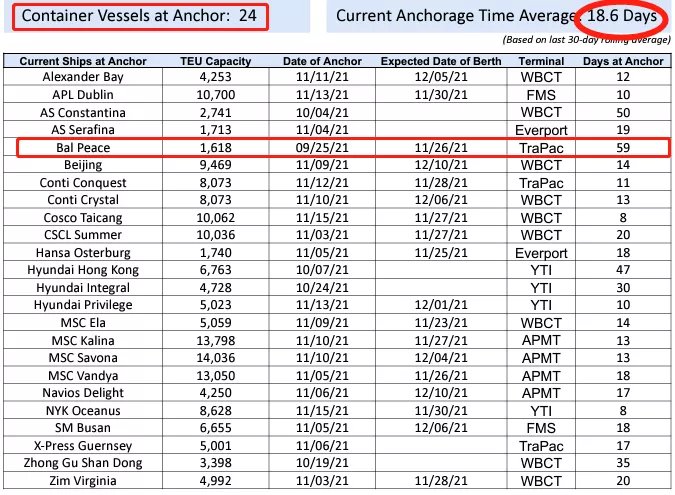Due to the new crown pneumonia quarantine requirements for the crew on the coastal feeder between South China and Hong Kong, the feeder operator announced that it will suspend services for at least 6 weeks before the Lunar New Year in 2022 (February 1 to 5, 2022). In consideration of this situation, ONE will suspend receiving cargoes arriving at the final destination via major ports in southern China and then via domestic branch lines. Any cargo that can go directly to South China by ocean-going vessels will not be affected.
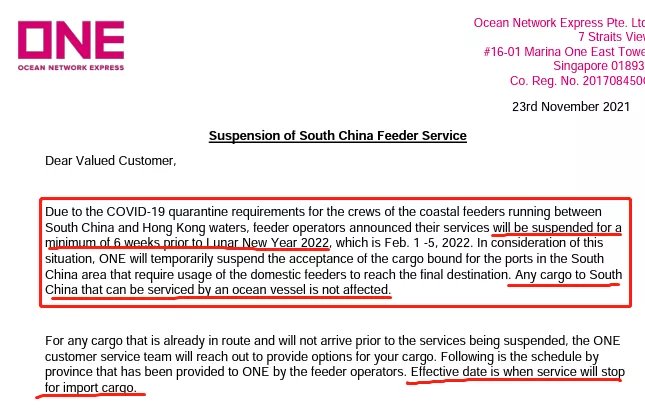
For any goods that are already in transit and will not arrive before the service is suspended, the ONE service team will provide customers with options for the goods. The following is the timetable by province and region provided by the feeder operator to ONE. The effective date is the date on which the service of imported goods ceases. The suspension of booking arrangements is shown in the table below:
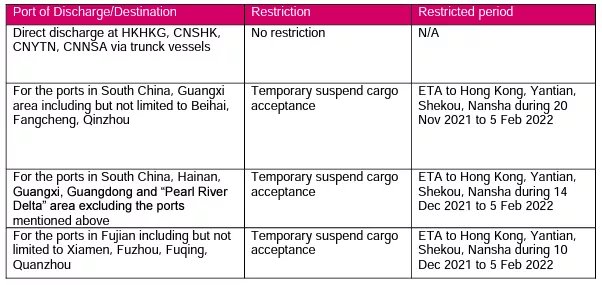
· There are no restrictions on direct unloading on the trunk lines of Hong Kong, Shekou, Yantian and Nansha ports;
· It is expected to arrive via Hong Kong, Shekou, Yantian, and Nansha ports from November 20, 2021 to February 5, 2022. The Guangxi region, including but not limited to Beihai, Fangcheng, and Qinzhou, will temporarily suspend receiving cargo;
· It is expected to arrive via Hong Kong, Shekou, Yantian, and Nansha from December 14, 2021 to February 5, 2022. Except for Hainan, Guangxi, Guangdong and the "Pearl River Delta" regions, the rest of the region will suspend receiving cargo;
· It is expected to arrive via Hong Kong, Shekou, Yantian, and Nansha from December 10, 2021 to February 5, 2022. Ports in Fujian, including but not limited to Xiamen, Fuzhou, Fuqing, and Quanzhou, will suspend receiving cargo.
LA/LB once again postponed fines for stranded containers. The ports of Los Angeles and Long Beach, the largest U.S. ports, announced on Monday that they will once again postpone their plans to impose fines on ocean shipping companies that fail to remove containers from the ports as quickly as possible, on the grounds that the supply chain has been secured since the end of last month. Significantly improved. This time the container overdue detention fee was postponed to November 29. This is the second extension of the fee. It was originally scheduled for November 15, and the first extension was announced last week.
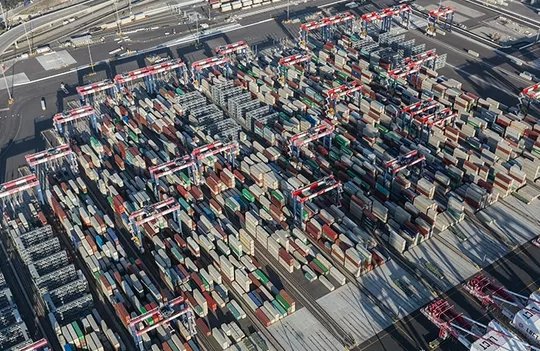
The executive directors of the Ports of Los Angeles and Long Beach said in a joint statement on Monday that since the new charges were announced in October, the amount of stranded cargo on these ports’ terminals has decreased by 33%. The board of directors is "satisfied with the progress so far," but will continue to monitor the situation and will reassess the implementation of the charges next week, after the two largest shopping days of the year, "Black Friday" and "Cyber Monday." On October 25, the Ports of Los Angeles and Long Beach, which account for 40% of the total cargo shipped by the United States, announced new charging measures aimed at alleviating the increasing congestion of cargo ships. However, the measure has since been postponed twice due to progress in container cleanup. In response to the second extension of charges for the Port of Los Angeles and Long Beach, ONE announced on November 23 that the company will support customers to pay the "container overdue detention fee" through the eModal platform from November 29 onwards, but Total Terminals The exception is the International (TTI) terminal, where TTI plans to charge customers directly. On November 22, Hapag-Lloyd also announced that customers can pay the fee through the eModal platform.
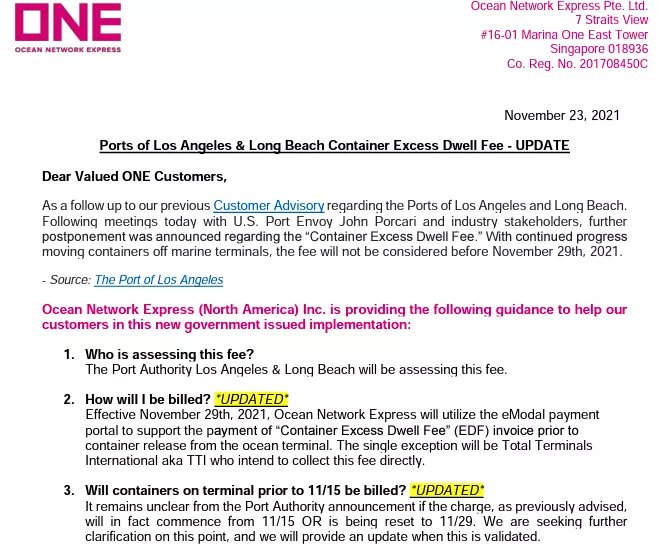
The Pacific Merchant Shipping Association (PMSA) said on Monday that the average time for imported containers to leave the terminal was 7.64 days. Among the containers stranded at the Port of Long Beach in Los Angeles, nearly 47% of the containers stayed for more than 5 days, up from 32.8% in September. As of November 22, there are 94 ships waiting for berths outside the Port of Los Angeles/Long Beach, and 63 of them are container ships. Among them, there are 46 ships outside the port of Los Angeles, 28 of which are container ships. In addition, the average waiting time for ships in the Port of Los Angeles has risen to 18.6 days, and the waiting time for the container ship "Bal Peace" has reached 59 days.
